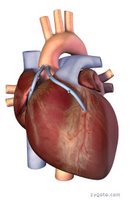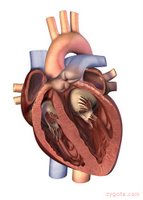 To sum up: the heart is amazing. There is no other muscle in the body like it, in that it is capable of contracting endlessly without tiring - it does so about 2.6 billion times before deciding to stop, and has the resilliency to pump about 85 bathtubs worth of blood through 60,000 miles of veins and arteries (Along with smaller, lesser things like capillaries) every day while it's at it. It has it's own electrical impulse system, which sends impulses to the different muscle components in such an order that, when everything goes according to plan, pumps blood through your body after rejuvenating it with an efficiency and grace that is simply astonishing.
To sum up: the heart is amazing. There is no other muscle in the body like it, in that it is capable of contracting endlessly without tiring - it does so about 2.6 billion times before deciding to stop, and has the resilliency to pump about 85 bathtubs worth of blood through 60,000 miles of veins and arteries (Along with smaller, lesser things like capillaries) every day while it's at it. It has it's own electrical impulse system, which sends impulses to the different muscle components in such an order that, when everything goes according to plan, pumps blood through your body after rejuvenating it with an efficiency and grace that is simply astonishing.The heart is basically a fueling station for all the little vehicles of air and fuel (henceforth known as "red blood cells") that travel around your body all day and keep you alive. They come to the heart through veins - vein basically means "to the heart" - through the Superior Vena Cava when the blood is coming from above the heart, and through the Inferior Vena Cava when it's from below. The blood passes into the Right Atrium, where it's sort of queued up waiting behind a valve (The Tricuspid Vavle, to be specific) before getting to rush into the Right Ventricle. From the Right Ventricle, something very exciting and unique happens, that is so strange and intrinsically amazing that I'm going to insert a paragraph break and tell you about if following.
< breathe >
Okay, so remember how vein basically means "towards the heart?" Well, arteries are exactly the opposite - they only pump blood away from the heart. Now, it would make sense that veins are ALWAYS bringing the tired and empty blood back to the heart for R&R, and that arteries are full of cheery little workers ready to help out the rest of your body. True? Not quite! You see, after blood has been sitting around in your Right Ventricle for a moment, it gets pumped - through an artery, because it's away from your heart - to your lungs to get filled up with oxygen and stuff. This artery, the Pulmonary Artery, is the only location in your entire body in which dead-tired blood gets pumped away from the heart!
So the blood gets oxygen, and then the reverse happens, as happy, livened blood comes back through the Pulmonary Vein to the Left Atrium (detecting a trend?). It sits there, all raring to go, then gets to pass through the Mitral Valve into the Right Ventricle (I really hope you're noticing that there's a pattern here) before shooting out through your body. It should be noted here that the Left Ventricle is a tough stud because it has to power the blood going to the rest of your body. From that Ventricle, it's a simple shot through the Aortic Valve, into the Aortic artery, and it's back to circulating around the body and recharging the rest of you. Simple.
 So how cool is that? The buh-bump sound you hear from your heart is various valves opening and closing in perfect harmony, getting the blood to you where you need it, when you need it (Much like Fedex, except better). In incredibly trained and gifted athletes, it can be large and strong and efficient enough that it only has to pump 30 times per minute while resting (Average for adults is around 75), but on demand it can speed things up to over 200BPM in some individuals to send your blood hurtling around your system so quickly that a red blood cell can get all the way around your body in only 20 seconds! It does this all automatically, with no thought from us. Really, our lives would be pretty boring if we did have to think about it all the time, because there's so much to it.
So how cool is that? The buh-bump sound you hear from your heart is various valves opening and closing in perfect harmony, getting the blood to you where you need it, when you need it (Much like Fedex, except better). In incredibly trained and gifted athletes, it can be large and strong and efficient enough that it only has to pump 30 times per minute while resting (Average for adults is around 75), but on demand it can speed things up to over 200BPM in some individuals to send your blood hurtling around your system so quickly that a red blood cell can get all the way around your body in only 20 seconds! It does this all automatically, with no thought from us. Really, our lives would be pretty boring if we did have to think about it all the time, because there's so much to it.The ancient Egyptians believed that the heart was the key and vital organ in a person's body, and was responsible for containing the soul and intelligence of the person. While we now know that the brain is alot responsible for that, maybe they were on the right track. For now, just have a heart.